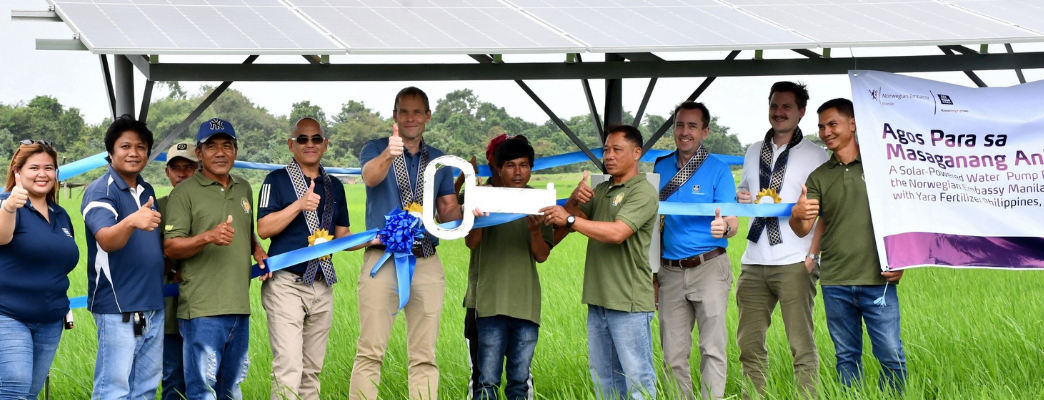
The government of Norway, in partnership with Yara Fertilizers Philippines, Inc. (Yara), is making significant strides in helping Filipino farmers increase productivity while transitioning to sustainable technology. Through the “Agos Para sa Masaganang Ani” program, the Norwegian government and Yara have implemented a pilot initiative in Barangay Santa Cruz, Calapan, Oriental Mindoro.
The Royal Norwegian Embassy has provided a generous grant of P4.0 million to the project, which has been used to procure and install 16 units of solar-powered water pumps. These pumps are now benefiting 55 farmers who cultivate crops across 80 hectares of rice fields. Each water pump has the capacity to irrigate up to 5.0 hectares of land, making a significant impact on the farmers’ ability to grow their crops efficiently.
All 16 units of the solar-powered water pumps have been successfully installed, and Yara will continue to engage with the farmers until April to monitor and evaluate the irrigation system’s performance. This evaluation will assess the impact on the productivity and profitability of the farmer beneficiaries. The Norwegian Embassy views this program as a proof-of-concept, demonstrating that the clean energy-food nexus can be a viable solution for the agriculture sector in the Philippines.
The primary goal of the program is to reduce the cost of irrigation in the barangay, which currently relies on traditional water pumps fueled by diesel. By transitioning to solar power, the project will not only enhance profitability and secure yields for the farmers but also significantly reduce carbon dioxide emissions. The solar-powered water pumps eliminate the heavy reliance on diesel fuel, resulting in a more sustainable and environmentally friendly irrigation system.
Norwegian Ambassador to the Philippines, Christian Halaas Lyster, emphasized that the government of Norway is committed to supporting projects that align with its advocacies, including climate change, environmental protection, and food security. He stated, “Norway gives priority to increasing food security and transitioning to renewable energy. This project accomplishes both objectives simultaneously.”
Ambassador Lyster believes that the pilot project in Mindoro can be scaled across different regions of the Philippines, ensuring increased food production while decreasing the overall carbon footprint. The installation of solar-powered water pumps is a calculated step towards achieving a nature-positive food future for the country. By reducing emissions and promoting regenerative agriculture, Yara aims to create a prosperous and sustainable farming industry.
Michael Ardieta, Yara’s Country Manager, explained that the project aligns with the company’s ambition of advancing a nature-positive food future for the Philippines. By utilizing solar power instead of 100% diesel, the project significantly reduces emissions. Additionally, Yara will provide crop nutrition solutions as part of proper farming management, including planting at the right time, using the right amount and type of fertilizers, and ensuring access to a reliable water source.
Ardieta emphasized that the main goal of the project is to increase the farmers’ income. By reducing their production costs through the use of solar power instead of diesel, the farmers will experience additional income. This project aims to create a regenerative future for Filipino farmers, where prosperity and sustainability go hand in hand.
The collaboration between the Norwegian government and Yara Fertilizers Philippines is a significant step towards achieving a more sustainable and prosperous agricultural sector in the Philippines. By harnessing the power of solar energy, Filipino farmers can increase their productivity while reducing their environmental impact. This initiative serves as a model for future projects that prioritize food security, climate change mitigation, and the transition to renewable energy.
Source: www.norway.no
